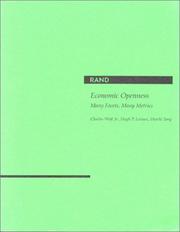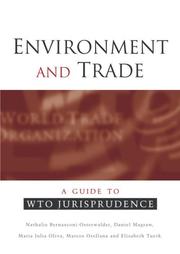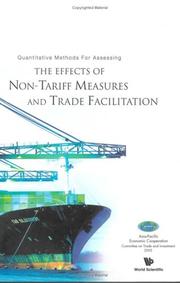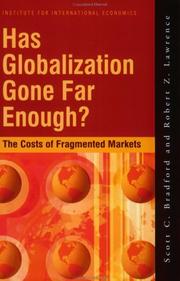| Listing 1 - 10 of 11 | << page >> |
Sort by
|

ISBN: 1282638963 9786612638961 0472023470 0472109316 9780472023479 9780472109319 Year: 2001 Publisher: Ann Arbor, Mich. : University of Michigan Press,
Abstract | Keywords | Export | Availability | Bookmark
 Loading...
Loading...Choose an application
- Reference Manager
- EndNote
- RefWorks (Direct export to RefWorks)
Evaluates methods for measuring nontariff barriers and recommends the most effective procedures.
Non-tariff trade barriers --- Statistical methods. --- Non-tariff distortions of trade --- Nontariff trade barriers --- Protectionism --- Tariff --- Statistical methods

ISBN: 0585317186 9780585317182 0833027379 9780833027375 Year: 1999 Publisher: Santa Monica, Calif. RAND
Abstract | Keywords | Export | Availability | Bookmark
 Loading...
Loading...Choose an application
- Reference Manager
- EndNote
- RefWorks (Direct export to RefWorks)
Non-tariff trade barriers --- Free trade --- International trade --- Commercial policy --- Foreign trade policy --- International trade policy --- Trade policy --- Economic policy --- International economic relations --- Free trade and protection --- Trade, Free --- Trade liberalization --- Non-tariff distortions of trade --- Nontariff trade barriers --- Protectionism --- Tariff --- Econometric models. --- Government policy

ISBN: 1280475528 9786610475520 1136567011 6000001266 1849771154 9781136567018 9781849771153 9781280475528 1844072983 9781844072989 9781136566967 9781136567001 9781138001978 1136567003 Year: 2006 Publisher: London Sterling, VA Earthscan
Abstract | Keywords | Export | Availability | Bookmark
 Loading...
Loading...Choose an application
- Reference Manager
- EndNote
- RefWorks (Direct export to RefWorks)
International trade rules have significant impacts on environmental law and policy, at the domestic, regional and global levels. At the World Trade Organization (WTO), dispute settlement tribunals are increasingly called to decide on environment- and health-related questions. Can governments treat products differently based on environmental considerations? Can they block the import of highly carcinogenic asbestos-containing products or genetically modified crops? Does the WTO allow governments to protect dolphins or endangered sea turtles through the use of import restrictions on certain produ
Foreign trade regulation --- Non-tariff trade barriers --- International trade --- Environmental policy --- Non-tariff distortions of trade --- Nontariff trade barriers --- Protectionism --- Tariff --- Export and import controls --- Foreign trade control --- Import and export controls --- International trade control --- International trade regulation --- Prohibited exports and imports --- Trade regulation --- Environmental aspects --- Law and legislation --- Environmental aspects. --- Economic aspects.
Book

ISBN: 9781783487110 1783487119 1783487127 9781783487127 Year: 2015 Publisher: London Rowman and Littlefield International
Abstract | Keywords | Export | Availability | Bookmark
 Loading...
Loading...Choose an application
- Reference Manager
- EndNote
- RefWorks (Direct export to RefWorks)
A timely and in-depth analysis of the Transatlantic Trade and Investment Partnership (TTIP) aimed at decision makers, advisors and analysts.
Foreign trade policy --- European Union --- United States --- Non-tariff trade barriers --- Trade regulation --- Barrières non tarifaires --- Commerce --- Law and legislation --- Droit --- Réglementation --- Transatlantic Trade and Investment Partnership. --- European Union countries --- Etats-Unis --- Pays de l'Union européenne --- Commercial treaties. --- Foreign economic relations --- Commercial treaties --- Accords commerciaux --- Relations économiques extérieures --- Barrières non tarifaires --- Réglementation --- Pays de l'Union européenne --- Relations économiques extérieures --- E-books --- Non-tariff distortions of trade --- Nontariff trade barriers --- Protectionism --- Tariff --- TTIP --- United States of America
Book
ISBN: 1781907552 9781781907559 1299718442 9781299718449 9781781907542 1781907544 Year: 2013 Volume: 12 Publisher: Bingley, U.K. Emerald
Abstract | Keywords | Export | Availability | Bookmark
 Loading...
Loading...Choose an application
- Reference Manager
- EndNote
- RefWorks (Direct export to RefWorks)
This volume presents new developments in non-tariff measure (NTM) policy analysis by leading authors in the field; from conceptual developments and methodology improvements, to a series of innovative cases studies. A novel policy research agenda underlies the book recognizing that some NTMs are required to sustain market exchange. The investigations address the welfare and trade impacts of standard-like NTMs in presence of market imperfections, their measurements, potential protectionism, and implications for North-South trade and income prospects in developing countries, including for small holders. Several analyses address the potential trade-cost effects of these NTMs through their lack of transparency, their heterogeneity across countries, and constraints to harmonize them and gains from harmonization. Several analyses investigate trade within OECD countries, including looking at export decisions by heterogeneous firms and the effect of harmonization of standards on firm productivity, and exploring the export-enhancing effect of a countrys own stringency in standards. Practical policy implications are drawn.
Free trade. --- Non-tariff trade barriers. --- Non-tariff distortions of trade --- Nontariff trade barriers --- Free trade and protection --- Trade, Free --- Trade liberalization --- Protectionism --- Tariff --- International trade --- Non-tariff trade barriers --- Foreign trade regulation --- E-books --- Export and import controls --- Foreign trade control --- Import and export controls --- International trade control --- International trade regulation --- Prohibited exports and imports --- Trade regulation --- Law and legislation --- Business & Economics --- Economic growth. --- International economics. --- Foreign trade regulation. --- General. --- Economics --- Comparative.
Book
ISBN: 1604567422 1616680830 9781616680831 9781604567427 9781604567427 Year: 2008 Publisher: New York
Abstract | Keywords | Export | Availability | Bookmark
 Loading...
Loading...Choose an application
- Reference Manager
- EndNote
- RefWorks (Direct export to RefWorks)
Europe -- Commercial policy. --- European Union countries -- Foreign economic relations. --- Foreign trade regulation -- European Union countries. --- Non-tariff trade barriers -- European Union countries. --- Tariff -- European Union countries. --- Foreign trade regulation --- Non-tariff trade barriers --- Tariff --- Commerce --- Business & Economics --- International Commerce --- Europe --- European Union countries --- Commercial policy. --- Foreign economic relations. --- Ad valorem tariff --- Border taxes --- Customs (Tariff) --- Customs duties --- Duties --- Fees, Import --- Import controls --- Import fees --- Tariff on raw materials --- Non-tariff distortions of trade --- Nontariff trade barriers --- Commercial policy --- Indirect taxation --- Revenue --- Customs administration --- Favored nation clause --- Reciprocity (Commerce) --- Protectionism
Book
ISBN: 1282399039 9786612399039 9047433521 9789047433521 9789004167346 900416734X Year: 2008 Publisher: Leiden Boston M. Nijhoff Publishers
Abstract | Keywords | Export | Availability | Bookmark
 Loading...
Loading...Choose an application
- Reference Manager
- EndNote
- RefWorks (Direct export to RefWorks)
This unique series offers the reader a comprehensive, bilingual analysis on a case-by-case basis of the jurisprudence of the WTO. Each case study contains: a synopsis and details of the case in question, and important bibliographical references; these are followed by a summary of the facts and procedure, claims of the parties, findings of the panel, issues raised in the appeal, conclusions of the appellate body and scholarly observations. Each case is analyzed by a different scholar in the field, so as to ensure the involvement in the series of the widest range of (English and French speaking) scholars and practitioners. This approach to the case-law gives the reader a complete and objective account of the reasoning of the dispute resolution mechanism, including numerous quotes (in italics when they are extracted from the case in question, for ease of reference), while at the same time offering a critical perspective, which analyses the reasoning adopted and places it in a global perspective. The volumes are organized chronologically, and the cases of a particular year are usually covered in two consecutive volumes. So far the case law of the following years has been published: 1996:-1997'; 1998; 1999-1'. More recent years and the intervening years will soon be published. Cette série unique d'ouvrages – en anglais et en français – a pour ambition de présenter au lecteur la « jurisprudence » de l’OMC de façon simple, cohérente et systématique. Chaque article obéit à une grille de lecture et contient ainsi le synopsis et les détails de l’espèce ainsi que de nombreuses références bibliographiques. Puis, après un bref rappel des faits et de la procédure, de la demande des parties, des conclusions du groupe spécial et de l’Organe d’appel, une rubrique « Observations » présente une approche critique de l’affaire. Les contributeurs sont aussi bien des universitaires que des praticiens, des francophones que des anglophones, avec la volonté éditoriale de tirer parti de tous les savoir-faire. Il y a aussi le souci d’aborder chaque affaire selon une double approche : d’une part, rendre compte fidèlement des raisonnements adoptés par les organes du mécanisme de règlement des différends, avec de nombreuses citations (en italiques lorsqu’elles sont extraites de l’affaire commentée) ; d’autre part, examiner ces raisonnements de la façon la plus complète et la plus objective en les replaçant dans une perspective d’évolution globale. Chaque volume est ordonné de manière chronologique, et, sauf exception, les affaires de chaque année sont traitées en deux volumes consécutifs. Les ouvrages relatifs aux affaires jugées entre 1996 et 1999 sont d’ores et déjà disponibles. La jurisprudence plus récente fera l’objet des prochains volumes de la collection.
Arbitrage. --- World Trade Organization. --- Arbitrage (Droit international privé) --- Clause compromissoire --- Commerce extéerieur --- Réglement de conflits --- Tarif douanier --- Tariff --- Dumping (International trade) --- Non-tariff trade barriers --- Foreign trade regulation --- Non-tariff distortions of trade --- Nontariff trade barriers --- Protectionism --- Antidumping --- Dumping (Commercial policy) --- Competition, Unfair --- International trade --- Ad valorem tariff --- Border taxes --- Customs (Tariff) --- Customs duties --- Duties --- Fees, Import --- Import controls --- Import fees --- Tariff on raw materials --- Commercial policy --- Indirect taxation --- Revenue --- Customs administration --- Favored nation clause --- Reciprocity (Commerce) --- Réglementation --- Droit --- Law and legislation --- Organisation mondiale du commerce.

ISBN: 9812560513 9786611372712 1281372714 9812701354 9789812701350 9789812560513 9781281372710 6611372717 Year: 2005 Publisher: Singapore APEC
Abstract | Keywords | Export | Availability | Bookmark
 Loading...
Loading...Choose an application
- Reference Manager
- EndNote
- RefWorks (Direct export to RefWorks)
As tariffs have fallen worldwide, the increasing importance of non-tariff policies for further trade liberalization has become widely recognized. The methods for assessing the potential effects of such liberalization have lagged significantly behind those available for analyzing tariffs. This book is the first volume that comprehensively addresses this gap. It has been designed to be useful for both economists and policymakers, especially for those involved in communicating ideas and results between economists and policymakers. This indispensable book contains cutting-edge discussions of the f
Foreign trade. International trade --- Non-tariff trade barriers --- Tariff --- Import quotas --- Foreign trade regulation --- Commercial policy --- Mathematical models --- Non-tariff trade barriers. --- Foreign trade policy --- International trade --- International trade policy --- Trade policy --- Export and import controls --- Foreign trade control --- Import and export controls --- International trade control --- International trade regulation --- Prohibited exports and imports --- Import controls --- Import licenses --- Import restrictions --- Ad valorem tariff --- Border taxes --- Customs (Tariff) --- Customs duties --- Duties --- Fees, Import --- Import fees --- Tariff on raw materials --- Non-tariff distortions of trade --- Nontariff trade barriers --- Government policy --- Law and legislation --- Economic policy --- International economic relations --- Trade regulation --- Trade adjustment assistance --- Indirect taxation --- Revenue --- Customs administration --- Favored nation clause --- Reciprocity (Commerce) --- Protectionism --- Non-tariff trade barriers - Mathematical models - Congresses --- Tariff - Mathematical models - Congresses --- Import quotas - Mathematical models - Congresses --- Foreign trade regulation - Mathematical models - Congresses --- Commercial policy - Mathematical models - Congresses

ISBN: 0881323497 9786611181734 0881324531 1281181730 1435631439 9781435631434 9780881323498 9780881323498 Year: 2004 Publisher: Washington Institute for international economics
Abstract | Keywords | Export | Availability | Bookmark
 Loading...
Loading...Choose an application
- Reference Manager
- EndNote
- RefWorks (Direct export to RefWorks)
International economic relations --- European Union --- North America --- AA / International- internationaal --- 382.11 --- 333.432.8 --- 333.81 --- 333.841 --- International economic integration --- Globalization --- -Trade blocks --- Non-tariff trade barriers --- Prices --- Markets --- Welfare economics --- 382 --- Economic policy --- Economics --- Social policy --- Public markets --- Commerce --- Fairs --- Market towns --- Commercial products --- Commodity prices --- Justum pretium --- Price theory --- Consumption (Economics) --- Cost --- Costs, Industrial --- Money --- Cost and standard of living --- Supply and demand --- Value --- Wages --- Willingness to pay --- Non-tariff distortions of trade --- Nontariff trade barriers --- Protectionism --- Tariff --- Common markets --- Economic integration, International --- Economic union --- Global cities --- Globalisation --- Internationalization --- International relations --- Anti-globalization movement --- Theorie van het internationale evenwicht. Economische onafhankelijkheid van een natie. Globalisering. Mondialisering. --- Internationale monetaire organisatie. Internationaal Muntfonds. Algemene leningovereenkomsten. --- Algemene evolutie van de kapitaalmarkt. --- Inflatie. --- Economic aspects --- European Union countries --- -North America --- EU countries --- Euroland --- Europe --- Economic integration --- Economic integration. --- Trade blocs --- Regional economic blocs --- Regional trading blocs --- Trading blocs --- International trade --- Integration, International economic --- Markets, Common --- Union, Economic --- Internationale monetaire organisatie. Internationaal Muntfonds. Algemene leningovereenkomsten --- Algemene evolutie van de kapitaalmarkt --- Inflatie --- Theorie van het internationale evenwicht. Economische onafhankelijkheid van een natie. Globalisering. Mondialisering --- International economic integration. --- Trade blocs. --- Non-tariff trade barriers. --- Prices. --- Markets. --- Welfare economics. --- Economic aspects. --- NON-TARIFF TRADE BARRIERS -- 330.191.6 --- WELFARE ECONOMICS -- 330.191.6
Book
ISBN: 0691157979 0691144796 9786613013378 1400838797 1283013371 9781400838790 6613013374 9780691144795 9781283013376 Year: 2011 Publisher: Princeton, NJ
Abstract | Keywords | Export | Availability | Bookmark
 Loading...
Loading...Choose an application
- Reference Manager
- EndNote
- RefWorks (Direct export to RefWorks)
Over the past two decades, governments have delegated extensive regulatory authority to international private-sector organizations. This internationalization and privatization of rule making has been motivated not only by the economic benefits of common rules for global markets, but also by the realization that government regulators often lack the expertise and resources to deal with increasingly complex and urgent regulatory tasks. The New Global Rulers examines who writes the rules in international private organizations, as well as who wins, who loses--and why. Tim Büthe and Walter Mattli examine three powerful global private regulators: the International Accounting Standards Board, which develops financial reporting rules used by corporations in more than a hundred countries; and the International Organization for Standardization and the International Electrotechnical Commission, which account for 85 percent of all international product standards. Büthe and Mattli offer both a new framework for understanding global private regulation and detailed empirical analyses of such regulation based on multi-country, multi-industry business surveys. They find that global rule making by technical experts is highly political, and that even though rule making has shifted to the international level, domestic institutions remain crucial. Influence in this form of global private governance is not a function of the economic power of states, but of the ability of domestic standard-setters to provide timely information and speak with a single voice. Büthe and Mattli show how domestic institutions' abilities differ, particularly between the two main standardization players, the United States and Europe.
Commercial policy --International cooperation. --- Complementarity (International law). --- Foreign trade regulation. --- International finance. --- Standardization --International cooperation. --- Commercial policy --- Foreign trade regulation --- International finance --- Standardization --- Complementarity (International law) --- Commerce --- Business & Economics --- International Commerce --- International cooperation --- -Foreign trade regulation --- -382.3 --- Industrial engineering --- Grading --- Mass production --- Specifications --- Testing --- International monetary system --- International money --- Finance --- International economic relations --- Export and import controls --- Foreign trade control --- Import and export controls --- International trade --- International trade control --- International trade regulation --- Prohibited exports and imports --- Trade regulation --- Foreign trade policy --- International trade policy --- Trade policy --- Economic policy --- Law and legislation --- Government policy --- E-books --- International cooperation. --- Complementarity principle (International law) --- Principle of complementarity (International law) --- Criminal procedure (International law) --- Jurisdiction (International law) --- International criminal courts --- International Accounting Standards Board. --- International Organization for Standardization. --- International Electrotechnical Commission. --- Commission Electrotechnique Internationale --- International organization for standardization --- Organisation internationale de normalisation --- IASB --- Law and globalization --- Privatization --- Denationalization --- Privatisation --- Contracting out --- Corporatization --- Government ownership --- Globalization and law --- Globalization --- Kuo chi piao chun hua tsu chih --- 国际标准化组织 --- Międzynarodowa Organizacja Normalizacyjna --- Organizația Internațională de Standardizare --- Mezinárodní organizace pro normalizaci --- ISO --- ИСО --- I.S.O. --- Mezhdunarodnai︠a︡ organizat︠s︡ii︠a︡ po standartizat︠s︡ii --- Международная организация по стандартизации --- International Standards Association --- International Standards Organization --- Kokusai Hyōjunka Kikō --- 国際標凖化機構 --- Europe. --- Financial Accounting Standards Board. --- Germany. --- United Kingdom. --- United States. --- accounting governance. --- accounting regulation. --- business administration. --- domestic interests. --- domestic standardization. --- economics. --- financial markets. --- financial reporting standards. --- focal rule-making institutions. --- global financial markets. --- global financial reporting. --- global private governance. --- global private regulation. --- global product markets. --- global regulation. --- global regulatory governance. --- global rule-making. --- institutional complementarity theory. --- institutional complementarity. --- institutional fragmentation. --- institutional reform. --- institutional structure. --- intergovernmental organizations. --- international competition. --- international private organizations. --- international product standards. --- international standard-setting. --- international standardization. --- law. --- legitimacy. --- market-based private regulation. --- nonmarket private governance. --- nontariff trade barriers. --- political science. --- power. --- private regulators. --- privatization. --- product markets. --- product regulation. --- product standards. --- public policy. --- public regulatory agencies. --- regulatory authority. --- rule-making institutions. --- rule-making. --- sociology. --- standardization. --- transgovernmental cooperation.
| Listing 1 - 10 of 11 | << page >> |
Sort by
|

 Search
Search Feedback
Feedback About UniCat
About UniCat  Help
Help News
News